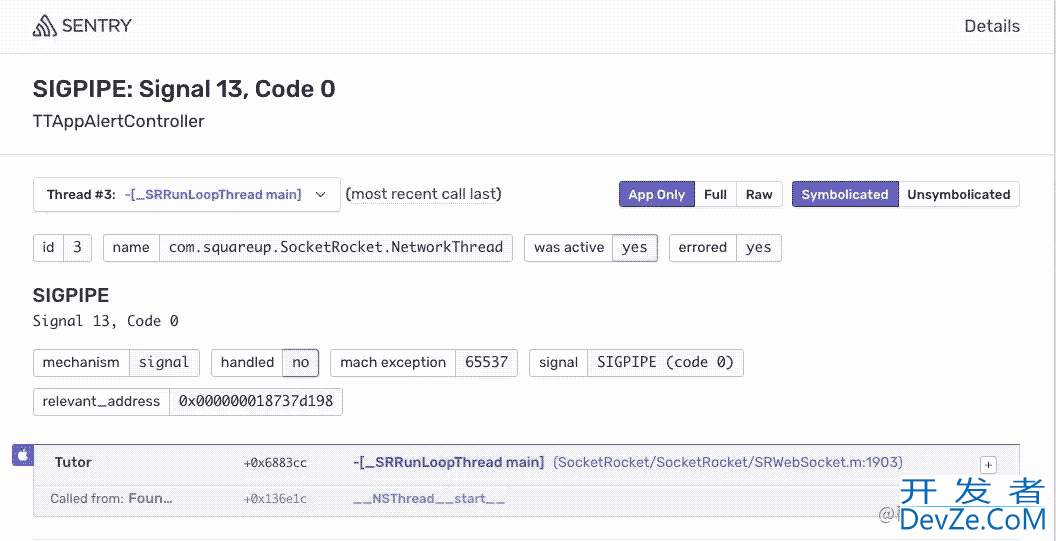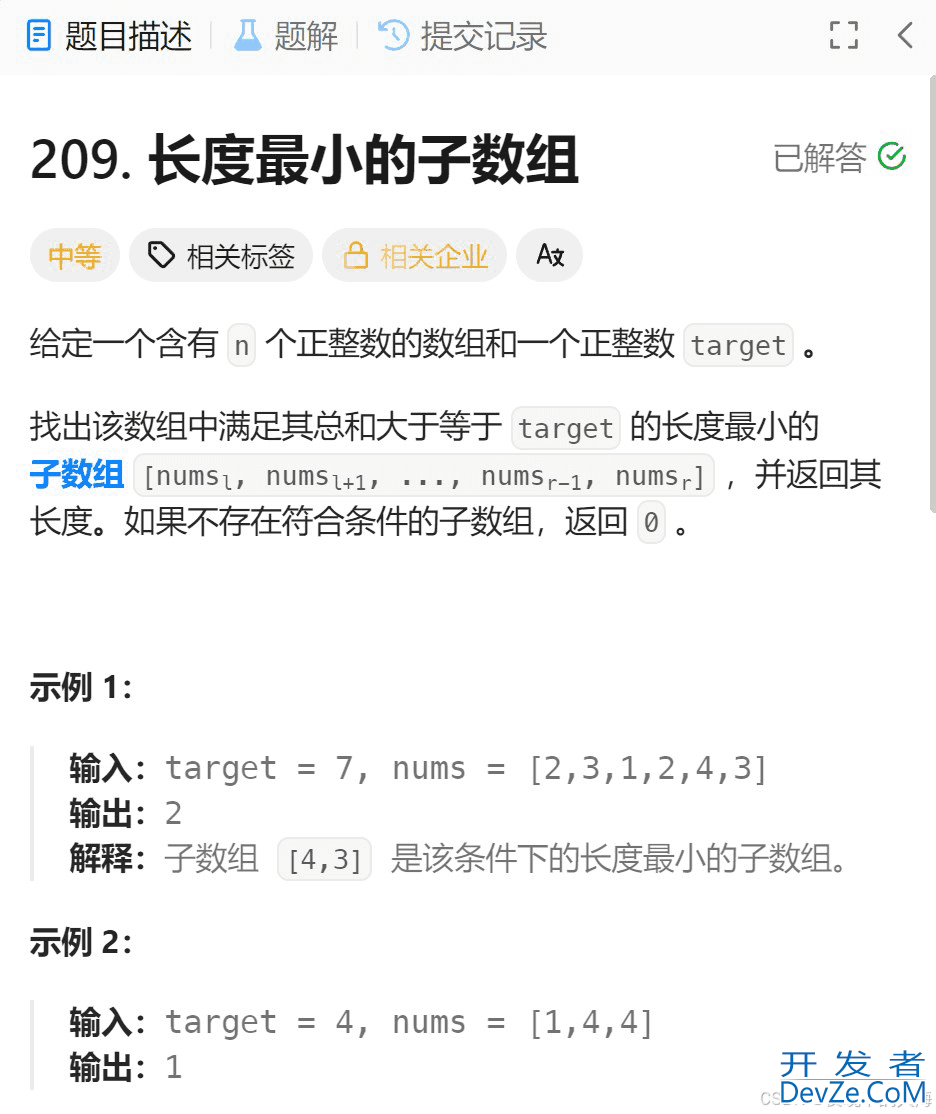SIGPIPE(Signal 13, Code 0) 异常排查及处理
目录
- 问题现象
- 排查过GLkKLIJ程
- 原因与处理
问题现象
最近一个版本 APP 更新之后,sentry 大量异常数据上报,影响用户的数量非常夸张 10w +,具体报错如下

排查过程
首先查看 SIGPIPE 的报错原因, 在官网搜索到了相关信息
大意是 Socket 连接关闭后,如果客户端仍在发送数据,这个时候就会产生 SIGPIPE 信号,如果信号没有被处理就会产生崩溃,这里截取了部分关键信息。

文档上说可以使用 signal(SIGPIPE, SIG_IGN) 全局忽略,确认客户端添加了该逻辑,但是异常还是上报到了 sentry。signal 这个函数是给信号关联一个 handler,收到这个信号的时候去执行。 SIG_IGN 是系统提供的忽略信号的处理方式,定义如下:
#define SIG_IGN (void (*)(int))1
尝试手动触发 SIGPIPE, 运行后可以正常输出。
void signalHandler(int signal) {
printf("bingo");
}
int main(int argc, char * argv[]) {
signal(SIGPIPE, signalHandler);
kill(getpid(), SIGPIPE);
}
多次添加 handler 继续尝试, 控制台输出 333, 也就是说只有最后添加的 handler 会执行到,比较容易理解一个信号只能关联一个 handler。
void signalHandler(int signal) {
printf("111");
}
void signalHandler2(int signal) {
printf("222");
}
void signalHandler3(int signal) {
printf("333");
}
int main(int argc, char * argv[]) {
signal(SIGPIPE, signalHandler);
signal(SIGPIPE, signalHandler2);
signal(SIGPIPE, signalHandler3);
kill(getpid(), SIGPIPE);
}
现状是 sentry GLkKLIJ可以捕获并处理这个异常,所以此时怀疑是 sentry 把客户端的处理给覆盖了。
查看 sentry 里面的逻辑,sentry 使用了 sigaction 函数关联 handler,这个函数与 signal 函数一样,可以设置与信号 sig 关联的动作,而 oact 如果不是空指针的话,就用它来保存原先对该信号的动作的位置,act 则用于设置指定信号的动作。sentry 关联了自己的处理 handleSignal 并且会把之前的handler 存储到数组 g_previousSignalHandlers 里面。
int sigaction(int sig, const struct sigaction *act, struct sigaction *oact); // sentry 关联的 action 为 handleSignal sigaction开发者_Python学习(fatalSignals[i], &action, &g_previousSignalHandlers[i])
sentry 在 handleSignal 里面上报异常并且执行了了 sentrycrashcm_handleException,然后使用 raise 重新抛出这个信号。
static void handleSignal(int sigNum, siginfo_t *signalInfo, void *userContjsext)
{
SentryCrashLOG_DEBUG("Trapped signal %d", sigNum);
if (g_isEnabled) {javascript
// 这里省略上报逻辑
sentrycrashcm_handleException();
}
SentryCrashLOG_DEBUG("Re-raising signal for regular handlers to catch.");
// This is technically not allowed, but it works in OSX and IOS.
raise(sigNum);
}
查看 handleException 简化后的调用栈:
void sentrycrashcm_handlejavascriptException(**struct** SentryCrash_MonitorContext *context)
{
sentrycrashcm_setActiveMonitors(SentryCrashMonitorTypeNone);
}
void sentrycrashcm_setActiveMonitors(SentryCrashMonitorType monitorTypes)
{
// isEnabled = false
setMonitorEnabled(monitor, isEnabled);
}
static inline void setMonitorEnabled(Monitor *monitor, bool isEnabled) {
uninstallSignalHandler();
}
static void uninstallSignalHandler(void) {
sigaction(fatalSignals[i], &g_previousSignalHandlers[i], **NULL**);
}
可以看到 handleException 这个函数最终会重新关联保存在 g_previousSignalHandlers里面的 handler,也就是客户端设置的 SIG_IGN 默认忽略。sentry 关联的函数 handleSignal 会在处理完会重新抛出信号,这个信号会触发 SIG_IGN,所以这里并不存在覆盖关系,sentry 不会影响到客户端默认忽略的逻辑。
综上客户端设置的 SIG_IGN 是会生效的,sentry 只是上报了异常,并没有崩溃产生。在 APP 里面手动触发 SIGPIPE,Charles 抓包可以看到 sentry 上报,APP 未出现崩溃。
原因与处理
和多个业务方确认这个版本并没有 socket 相关的改动,那为什么在这个版本之后突然有大量异常上报呢?
后面 diff 代码发现是改动了 sentry 的初始时机造成的。之前的逻辑是 sentry 初始化,客户端调用 signal 关联 SIG_IGN,这个时候 SIG_IGN 覆盖了 sentry 的 signalHandler,并且没有保存和恢复之前 handler 的逻辑,sentry 捕获不到信号不会上报,当前版本的改动使这个顺序颠倒了,导致了大量异常数据上报。后续尝试去定位具体的 socket 无果,重新修改了顺序 SIG_IGN 在 sentry 初始化之后关联,之后的版本不再有异常数据上报。
以上就是SIGPIPE(Signal 13, Code 0) 异常排查及处理的详细内容,更多关于SIGPIPE异常排查的资料请关注我们其它相关文章!






 加载中,请稍侯......
加载中,请稍侯......
精彩评论